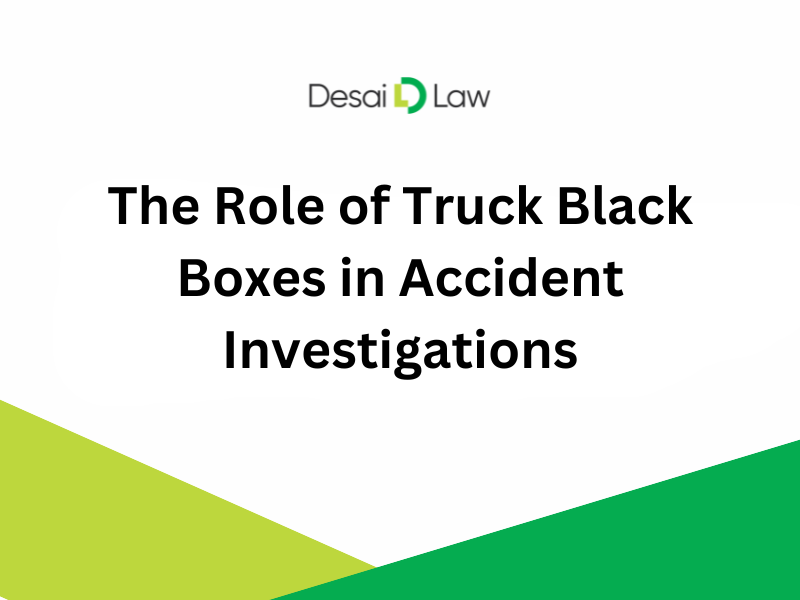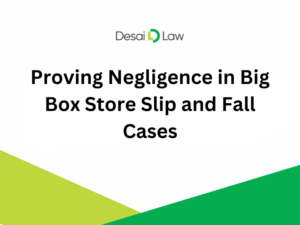Truck black boxes aren’t just helpful in crash investigations—they’re becoming a major part of the commercial vehicle industry. The North American market alone is projected to reach over $1.3 billion by 2025, up from $1 billion in 2021. With a steady growth rate and increasing reliance on digital evidence, these devices are shaping how truck accident cases are handled across the U.S.
Why? Because they hold facts—objective, time-stamped data that can reveal what happened before, during, and after a crash. Things like speed, braking patterns, and how long the driver had been on the road. But even though this information exists, accessing it isn’t always straightforward.
After a crash, the trucking company often acts quickly to control the situation. That might mean limiting what gets shared or pushing for a fast settlement before you’ve had time to gather what you need. That’s why timing and legal support matters. To ensure your side of the story is backed by solid evidence, connect with a Morgantown truck accident lawyer at The Desai Firm. Your rights and your case depend on it.
What Is a Truck Black Box?
Truck black boxes are commonly referred to as Electronic Control Modules (ECMs) or Event Data Recorders (EDRs). Many commercial trucks also have Electronic Logging Devices (ELDs), which are federally mandated to track a trucker’s driving hours.
These devices are built directly into the truck’s engine and other systems. Think of them as silent witnesses—recording critical data whether there’s an incident or not. That information can become central to an investigation, especially when the fault is being disputed after an accident. Truck black boxes track the following:
- Speed at the time of the crash
- Sudden braking or acceleration
- Engine throttle position
- Whether and when the brakes were applied
- Steering inputs and GPS location
- Hours of service logs (which help determine if the driver was overworked or fatigued)
- Seat belt use and airbag deployment
This data paints a second-by-second picture of what the truck was doing leading up to the crash. And that’s where its real value lies.
Why Black Box Data Matters in Accident Investigations
After a truck crash, one of the biggest challenges is figuring out what really happened. If the truck driver claims they were obeying all the rules, and there are no witnesses to back you up, it can feel like a dead end. But black box data can change that. This data becomes a critical part of the investigation—and often, the legal case that follows.
Proves Driver Behavior and Violations
Black box records can clearly show if the trucker was speeding, failed to brake in time, or violated hours-of-service rules. If the driver had been behind the wheel longer than allowed by law, it may indicate fatigue—one of the most common causes of trucking accidents. This data makes it harder for the trucking company to deny fault.
Reconstructs the Crash
Using black box data, investigators can create a moment-by-moment breakdown of the crash. The data shows how fast the truck was moving when the brakes were applied, whether there were signs of swerving, and more. It paints a clearer picture than any verbal account ever could.
Challenges or Confirms the Driver’s Story
If the driver says they slammed on the brakes or tried to avoid the crash, the black box will either back that up—or prove it false. This kind of fact-checking is beneficial when dealing with insurance adjusters or company lawyers trying to shift blame.
Shows Patterns of Negligence
Sometimes, black box data reveals a bigger issue. If the driver had been consistently speeding or skipping rest periods, or if multiple mechanical warnings had been ignored, it may show a pattern of negligence. That’s not just about one bad decision—it could point to a trucking company that routinely puts profits over safety.
Reveals Vehicle Malfunctions
In some cases, it’s not the driver but the truck itself that causes the crash. Black boxes can log issues like brake failure, engine problems, or other system errors. If the company failed to maintain the vehicle, and that failure led to your injuries, they could be held legally responsible.
Strengthens Legal Claims and Trial Evidence
Whether you’re negotiating a settlement or taking your case to trial, black box data adds weight to your side. It’s hard for a trucking company or insurer to argue with hard numbers and time-stamped records. In front of a jury, that kind of evidence speaks louder than excuses.
Challenges in Accessing Black Box Data
While black box data is powerful, it’s not always easy to get. Trucking companies own the trucks—and the data. That means they control access, and not every company is quick to hand it over.
The data can be erased
Some black boxes automatically overwrite their data after a certain number of drive cycles or days. Others can be manually wiped. If a trucking company suspects a lawsuit is coming, there’s a real risk the data could be erased—either intentionally or through routine maintenance, unless immediate action is taken to preserve it.
You need legal authority to access it
The trucking company isn’t required to hand over black box data just because you ask. Most of the time, a spoliation letter is needed. This legal notice tells the company to preserve all evidence, including the black box data. They can face serious legal consequences if they destroy or alter it after receiving this notice.
The data is technical and hard to interpret
Even when you get the data, it isn’t user-friendly. It comes in raw form—lines of codes, timestamps, and diagnostic signals. It takes professionals who work with this kind of data regularly to interpret it correctly and connect it to what happened during the crash.
Reach Out to Morgantown Truck Accident Lawyers Today
Trucking companies are prepared the moment something goes wrong. They’ve got protocols, legal teams, and insurance reps ready to protect their bottom line. If you’ve been injured in a truck crash, you need a plan, too—and that starts with calling The Desai Firm. We focus on helping people like you understand your options, access necessary evidence like black box data, and push back when the other side tries to minimize your injuries or your story. We move fast to lock down what matters—before it disappears. Dial 304-974-1974 or share your details through our online form. Either way, we’ll take it from there and help you move forward.





